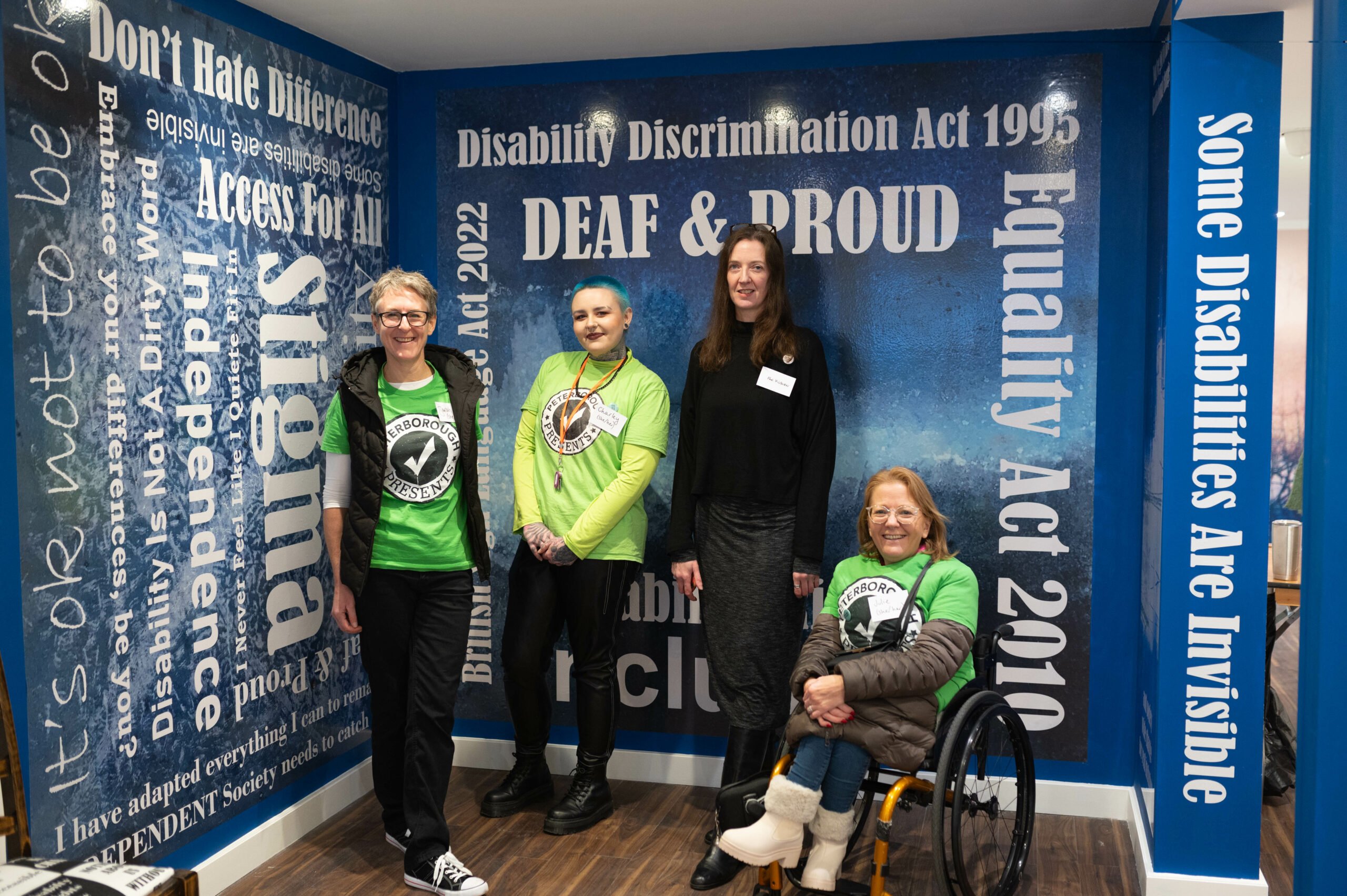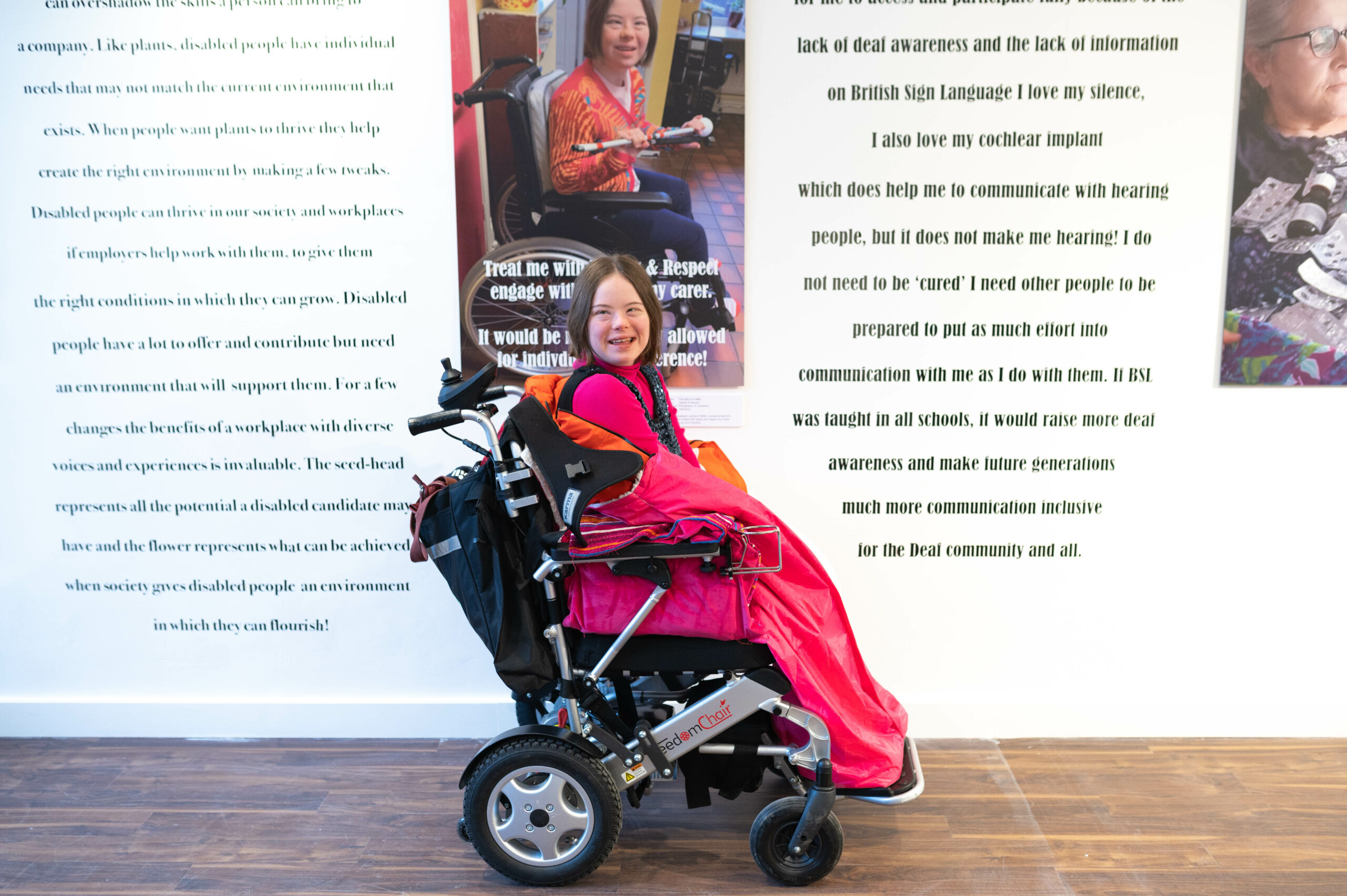
Peterborough Presents team in the protest corner of the Reasonable Adjustment exhibition
Photo: Leia Ankers
EDI: Making reasonable adjustments
Creative People and Places (CPP) programmes take an action research approach to community engagement in arts, creativity and culture. Evaluator Jamie Buttrick has been working with Peterborough Presents to draw out learning from their work with d/Deaf, disabled and neuro-divergent communities and artists.
Peterborough Presents is one of 39 CPP programmes in England, working in places where evidence suggests that people, on average, are less likely to be involved in arts and cultural activities.
With funding from Arts Council England, CPP aims to support, discover and learn from how people can take the lead in choosing, creating and taking part in brilliant creative experiences in the places they live.
Peterborough Presents works with communities, artists and a range of voluntary and community organisations to create fun, diverse and relevant art, and creative opportunities. The programme began in 2015 and quickly moved to using a targeted approach in hyperlocal areas.
The hyperlocal approach is complemented by a range of delivery on a thematic or Peterborough-wide level, including the Reasonable Adjustment programme – a creative project developed with and the d/Deaf, disabled and neuro-divergent (DDN) community.
Positive steps
Around 1 in 4 people in the UK have a disability and the DDN community in particular experiences a range of socioeconomic barriers to participating in creative activities. As a result, millions of people with access needs fail to benefit from a range of quality-of-life opportunities, and a variety of organisations miss out on the ‘purple pound’ or spending power of disabled people.
In 2021, just 14% of the Peterborough Presents audience identified as being affected by a disability. In the spirit of CPP, the programme set out to explore the reasons why, remove access barriers to participation, and plan co-created relevant and accessible creative programmes with and for the DDN community.
Positive steps included establishing an Equality, Diversity and Inclusion (EDI) panel to help shape delivery, and the employment of access coordinator Julie Fernandez to help improve communications, assess the appropriateness of venues, and support staff and artists to maximise accessibility.
Service improvements have been notable, from the initial application process for commissions through to the delivery of events and performances. By 2023-24, the proportion of Peterborough Presents’ audience identifying as DDN had increased to 44%.
The Reasonable Adjustment programme, which references the 1995 Disability Discrimination Act, emerged from these changes to programme delivery. The result was a creative project developed with and for DDN people and aimed to celebrate and raise awareness of the lived experiences of the DDN community in Peterborough.
It incorporated a residency with lead artist Fae Kilburn, a research residency, an exhibition in the city centre, an artwork trail around Peterborough, printmaking, zine making, and a fashion show. It culminated on International Day of People with Disabilities in December 2023 and engaged 5,882 people.

Millie beside a photo of herself in the Reasonable Adjustment exhibition. Photo: Leia Ankers
Co-commissioning in the context of Reasonable Adjustment
Co-commissioning brings resources and expertise closer together. It can help to create a more culturally relevant, and therefore accessible, impactful and meaningful experience.
The Reasonable Adjustment programme was shaped and driven through a collaborative approach including a community commissioning panel representing the DDN community, service providers and independent creatives. Partners included RNIB, Peterborough Council for Voluntary Services, Disability Peterborough, Peterborough & District Deaf Children’s Society and Scope.
The combination of partners took the advantages of co-commissioning to a different level. The approach not only harnessed the lived personal and professional experience of partners, it also galvanised very relevant perspectives of the challenges faced by the DDN community. Further added value was gleaned from this group of dedicated people with the knowledge and desire to offer practical help, from sitting on interview panels, to volunteering at the exhibition and facilitating access to the DDN community.
Reasonable Adjustment highlighted the benefit of people with experience of working with and supporting the DDN community from both creative and community perspectives coming together. When combined with the rare opportunity to focus on the whole DDN community rather than one disability, the impact of bringing such a representative, intersectional group together was maximised.
Quality of programme outputs
Our evaluation found the quality of the programme’s processes and outputs was enhanced as a result of the co-commissioning approach. The alignment of partner strengths with programme aims reflected the shared and unique challenges facing members of the DDN community in Peterborough and added an additional layer of meaning to the programme.
It also stimulated a wealth of added personal, strategic and political value to the outcomes generated for participants, visitors and partners alike. People identifying as DDN particularly appreciated the focus on their own lived experience and opportunity to highlight related challenges.
The success of this exhibition was that it was person centred. It had the collective voice of the DDN community.
Co-commissioning legacies from Reasonable Adjustment
It is only when the fear of exploring EDI issues is removed that steps towards improved accessibility for the DDN community and artists can be made. The collaborative approach to the Reasonable Adjustment programme has contributed to strong individual, organisational and creative legacy impacts which partners can now replicate and share across both creative and community sectors.
Crucially, the co-commissioning approach has seen the emergence of a desire among the DDN community to use creativity to inspire social change and service improvement. With reference to a ‘Protest Corner’ in the exhibition citing government policies alongside protest slogans used in DDN activism, DDN individuals active on the commissioning panel have personified the value of creativity in effecting change.
From the blossoming confidence required to challenge inadequate care, making contributions to civic life and developing artistic practice, the impacts of the Reasonable Adjustment programme are many and varied.
The journey to greater accessibility has taken its first positive steps. Many more are required.
It has brought all of these disparate disabled people together, who are collectively feeling more powerful than they have felt in a long time.
Greater depth on the Peterborough Presents journey with Access Coordinator Julie Fernandez and the Reasonable Adjustment programme is available from a podcast and digital zine.
Join the Discussion
You must be logged in to post a comment.